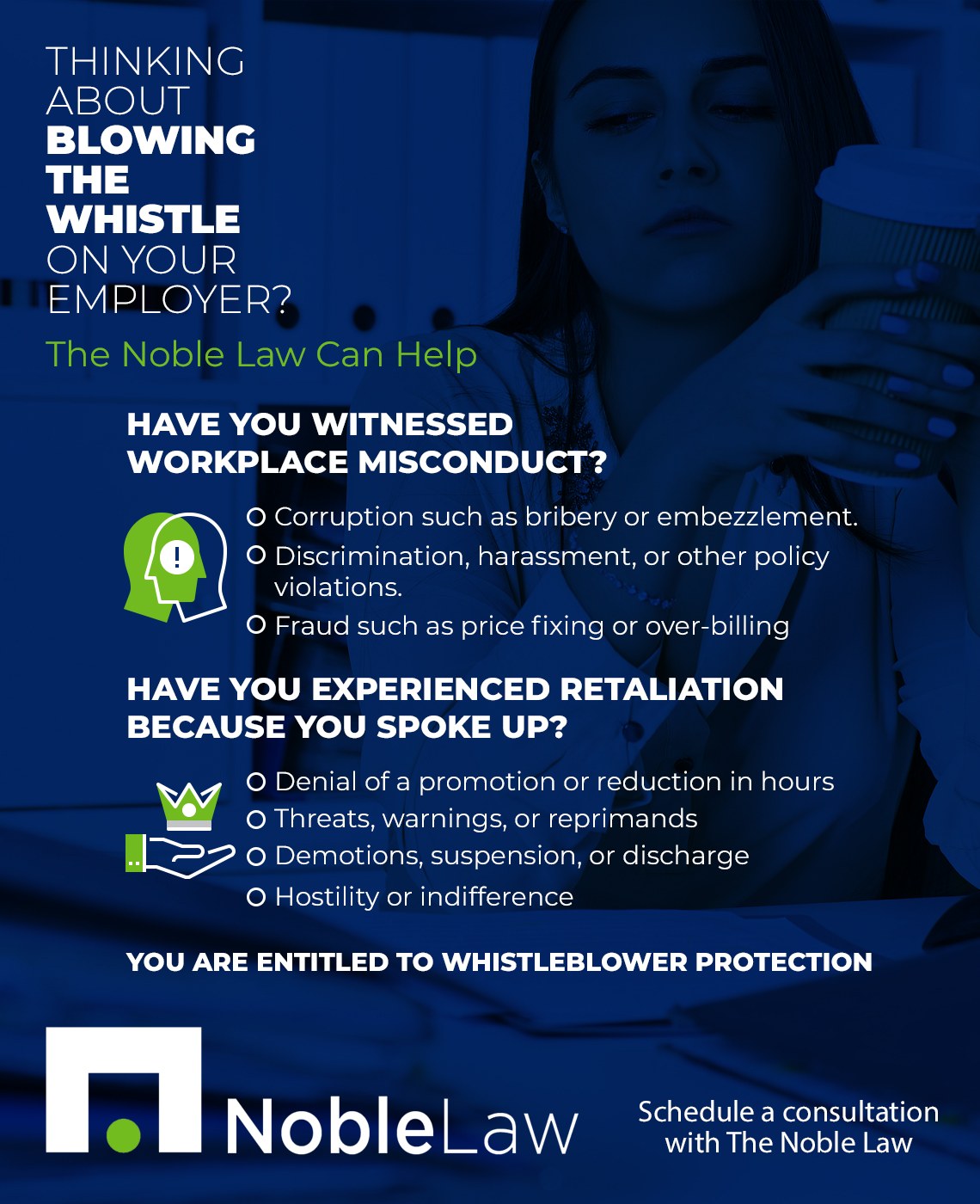Founded in 2009, The Noble Law provides consultations and legal advice to clients in South Carolina and across North Carolina on a variety of employment law issues, including workplace retaliation and whistleblower law. When you choose to partner with us, we will treat you as part of the team and provide you with top-notch, compassionate service. Open communication is key, and our employment law attorneys will support you every step of the way.
When it comes to workplace retaliation, whistleblower protection, or other issues regarding employment law, it can be hard to reach out to an employment attorney. Here at The Noble Law, we will work hard to understand your situation and help you identify your legal options, whether you choose to move forward with our firm or not. Schedule a consultation with a whistleblower lawyer in South Carolina or North Carolina today.



Workplace retaliation happens when an employer takes harmful action against an employee for engaging in legally protected activities, such as filing a complaint, reporting misconduct, or requesting accommodations. These retaliatory measures are often aimed at punishing, seeking revenge, or asserting dominance over the employee.
Retaliation can leave you feeling powerless and unsafe in your own work environment. It not only affects your career but can take a toll on your mental well-being, too.
At The Noble Law, we have helped many clients in Winston-Salem, NC, fight back against unjust treatment and reclaim their rights. If you suspect you have been targeted for retaliation, it is best to consult a knowledgeable Winston-Salem workplace retaliation attorney immediately. We can help you pursue the compensation and justice you deserve.
Protected Activities Leading to Retaliation
Speaking up in the workplace should never lead to unfair treatment, but it sometimes does. Here are key areas where employees are protected by law:
- Filing a Harassment or Discrimination Complaint
- Reporting Illegal Practices (Whistleblowing)
- Requesting Reasonable Workplace Accommodations
- Participating in Investigations
- Exercising Family and Medical Leave Rights
- Engaging in Union Activities and Collective Bargaining
- Reporting Wage and Hour Violations
Engaging in these activities is your legal right, and any retaliation for doing so can lead to legal consequences for your employer.


Types of Workplace Retaliation
Here are the most common types of retaliation employees might encounter:
Demotion or Job Reassignment
Employers may retaliate by changing your position or responsibilities, assigning you a less favorable role, often without a valid reason.
Wage Reductions or Loss of Benefits
Retaliation can include reductions in salary, withheld bonuses, or cuts in benefits like health insurance.
Wrongful Termination
Being fired without just cause due to reporting issues, participating in investigations, or asserting your rights.
Harassment and Hostile Work Environment
Increased harassment or a toxic workplace environment can be a form of retaliation, including unfair discipline or exclusion from key activities.
Blacklisting or Damage to Reputation
Employers might harm your career by refusing to provide a reference, blacklisting you, or spreading negative information to future employers.
Proving retaliation can be challenging, as employers often try to hide their motives. To establish retaliation, you will need to show a clear connection between the action you took and the retaliatory behavior. An employment attorney can help you do just that to build the strongest possible legal case.
Federal and North Carolina Retaliation Laws
Both federal and North Carolina state laws offer critical protections for employees who experience retaliation after asserting their rights, whether it is reporting unlawful practices or refusing to participate in illegal activities. Below are key laws that safeguard workers from retaliatory actions:
- Title VII of the Civil Rights Act: Protects employees from retaliation for reporting discrimination based on race, color, religion, sex, or national origin or participating in related investigations or lawsuits.
- The Fair Labor Standards Act (FLSA): Safeguards workers from retaliation for asserting their rights to minimum wage, overtime pay, or workplace safety standards.
- Sarbanes-Oxley Act: Shields whistleblowers in publicly traded companies from retaliation when reporting corporate fraud or violations of securities laws.
- North Carolina Retaliatory Employment Discrimination Act (REDA): Provides protections for employees who report violations of state workplace safety, wage, or other public policy laws.
- The Clean Air Act (CAA): Protects employees from retaliation for raising concerns about violations affecting air quality or public health.
- The Safe Drinking Water Act (SDWA): Prohibits retaliation against workers who report threats to the safety or quality of public drinking water.
- Solid Waste Disposal Act: Defends employees who report improper handling, storage, or disposal of hazardous waste from employer retaliation.
- Anti-Money Laundering Act: Protects employees from retaliation for reporting suspected financial crimes, such as money laundering or fraud.



Steps to Take if You Experience Workplace Retaliation
If you suspect retaliation in your workplace, here is how to proceed:
- Gather Evidence: Begin by compiling a detailed record of any retaliatory behavior you’ve experienced. This can include emails, performance reviews, witness statements, pay stubs, and any correspondence that shows a shift in treatment after you engaged in a protected activity.
- File a Formal Complaint: Depending on the nature of the retaliation, you may need to file a formal complaint with agencies such as the Equal Employment Opportunity Commission (EEOC) or the North Carolina Department of Labor.
- Consult with a Workplace Retaliation Attorney: At The Noble Law, we will listen to your concerns, assess the details of your situation, guide you on the legal avenues available, and help you understand the protections and remedies that may apply.
How A Workplace Retaliation Attorney Can Help
If you are facing workplace retaliation, our role is to guide you through this challenging situation with the legal support you need. We’ll help you gather key documentation that connects the retaliation to your protected actions. Our team will file any necessary complaints or lawsuits on your behalf to hold your employer accountable.
We will help negotiate a fair settlement when possible, aiming to resolve the matter efficiently and without the need for lengthy court battles. However, if the case goes to trial, we are prepared to represent you through every step, including depositions, hearings, and, if necessary, a full trial.
Beyond securing compensation for lost wages, we aim to secure remedies that restore your sense of justice. This includes job reinstatement, where applicable, as well as seeking punitive damages for particularly harmful retaliation.
Where necessary, we can also pursue injunctive relief to prevent further retaliation and create a safer work environment moving forward. We aim to bring closure to this difficult chapter in your career.
Contact Us
We invite you to schedule a consultation to discuss your situation, answer your questions, and provide an overview of your options. Whether you prefer to speak with us over the phone, book an appointment online, or meet with us in person at our North Carolina office, we are ready to connect in a way that works best for you.

Learn More
You deserve a safe, ethical, and legal workplace, and our employment law firm is here to help you protect your rights. If you have questions about whistleblower protections available to you in North Carolina or South Carolina, contact The Noble Law.
Here at The Noble Law, we listen. We hear you. We understand. Call today to discuss your rights and duties as a workplace whistleblower.
Along with representing clients with claims in the area of workplace retaliation and whistleblower protections, we also represent employees in a variety of other areas of employment law. These include Executive compensation disputes, Workplace discrimination, Pay, overtime, and leave, Workplace harassment, sexual harassment, and workplace assault, and Workplace investigations.
Learn more about our employment law firm’s Practice Areas and check out our About Page. When you choose to work with The Noble Law, you will gain a clear understanding of your legal options, whether you choose to move forward with our employment law firm or not. Our employment lawyers advise and represent clients in North Carolina and South Carolina, with offices in Charlotte, Chapel Hill, and Mt. Pleasant. If you’re interested in speaking with one of our employment attorneys, contact us today.


